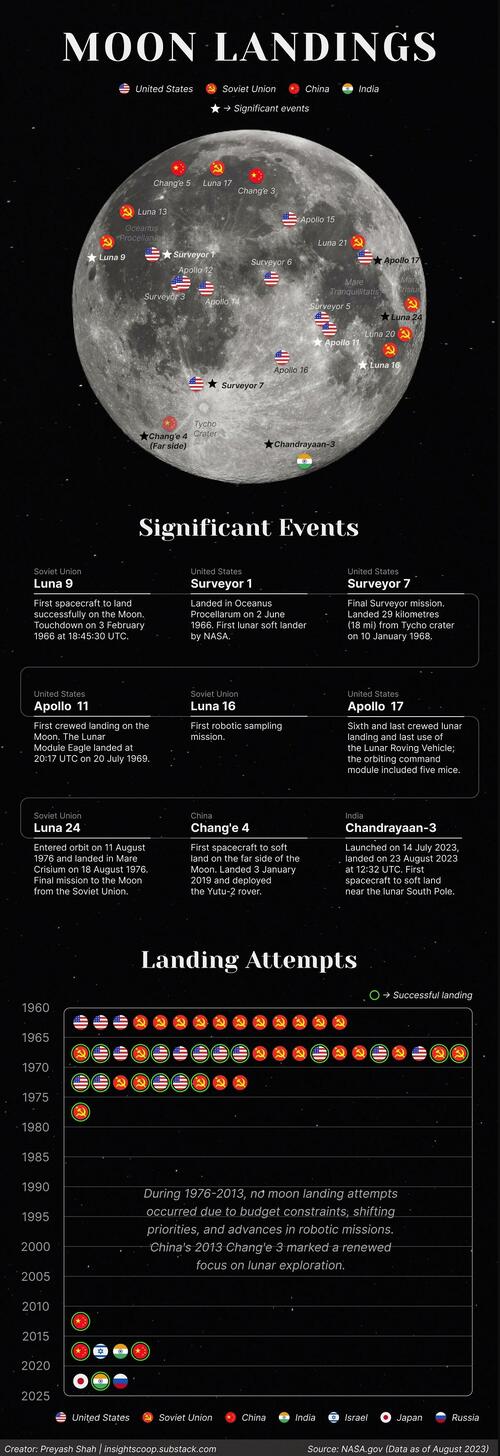
Since before Ancient Greece and the first Chinese Dynasties, people have sought to understand and learn more about the moon.
Curiosity and centuries of study culminated in the first moon landing in the 1960s. But there have been many other attempted moon landings, both before and after.
This chart by Visual Capitalists' Preyash Shah illustrates all the moon landings using NASA data since 1966 when Soviet lander Luna 9 touched down.
Race to the Moon
The 1960s and 1970s marked an era of intense competition between the U.S. and the Soviet Union as they raced to conquer the moon.
During the Cold War, space became a priority as each side sought to prove the superiority of its technology, its military firepower, and its political-economic system.
In 1961, President John F. Kennedy set a national goal to have a crewed lunar landing and return to Earth.
After several failed attempts from both sides, on July 20, 1969, the Apollo 11 mission was successful and astronauts Neil Armstrong and Buzz Aldrin became the first humans to set foot on the moon.
| Mission | Launch Date | Operator | Country | Mission Type | Outcome |
|---|---|---|---|---|---|
| Ranger 3 | 26-Jan-62 | NASA | 🇺🇸 U.S. | Lander | Spacecraft failure |
| Ranger 4 | 23-Apr-62 | NASA | 🇺🇸 U.S. | Lander | Spacecraft failure |
| Ranger 5 | 18-Oct-62 | NASA | 🇺🇸 U.S. | Lander | Spacecraft failure |
| Luna E-6 No.2 | 4-Jan-63 | OKB-1 | ☭ USSR | Lander | Launch failure |
| Luna E-6 No.3 | 3-Feb-63 | OKB-1 | ☭ USSR | Lander | Launch failure |
| Luna 4 | 2-Apr-63 | OKB-1 | ☭ USSR | Lander | Spacecraft failure |
| Luna E-6 No.6 | 21-Mar-64 | OKB-1 | ☭ USSR | Lander | Launch failure |
| Luna E-6 No.5 | 20-Apr-64 | OKB-1 | ☭ USSR | Lander | Launch failure |
| Kosmos 60 | 12-Mar-65 | Lavochkin | ☭ USSR | Lander | Launch failure |
| Luna E-6 No.8 | 10-Apr-65 | Lavochkin | ☭ USSR | Lander | Spacecraft failure |
| Luna 5 | 9-May-65 | Lavochkin | ☭ USSR | Lander | Spacecraft failure |
| Luna 6 | 8-Jun-65 | Lavochkin | ☭ USSR | Lander | Spacecraft failure |
| Luna 7 | 4-Oct-65 | Lavochkin | ☭ USSR | Lander | Spacecraft failure |
| Luna 8 | 3-Dec-65 | Lavochkin | ☭ USSR | Lander | Spacecraft failure |
| Luna 9 | 31-Jan-66 | Lavochkin | ☭ USSR | Lander | Successful |
| Surveyor 1 | 30-May-66 | NASA | 🇺🇸 U.S. | Lander | Successful |
| Surveyor 2 | 20-Sep-66 | NASA | 🇺🇸 U.S. | Lander | Spacecraft failure |
| Luna 13 | 21-Dec-66 | Lavochkin | ☭ USSR | Lander | Successful |
| Surveyor 3 | 17-Apr-67 | NASA | 🇺🇸 U.S. | Lander | Successful |
| Surveyor 4 | 14-Jul-67 | NASA | 🇺🇸 U.S. | Lander | Spacecraft failure |
| Surveyor 5 | 8-Sep-67 | NASA | 🇺🇸 U.S. | Lander | Successful |
| Surveyor 6 | 7-Nov-67 | NASA | 🇺🇸 U.S. | Lander | Successful |
| Surveyor 7 | 7-Jan-68 | NASA | 🇺🇸 U.S. | Lander | Successful |
| Luna E-8 No.201 | 19-Feb-69 | Lavochkin | ☭ USSR | Lander | Launch failure |
| Luna E-8-5 No.402 | 14-Jun-69 | Lavochkin | ☭ USSR | Lander | Launch failure |
| Luna 15 | 13-Jul-69 | Lavochkin | ☭ USSR | Lander | Spacecraft failure |
| Apollo 11 | 16-Jul-69 | NASA | 🇺🇸 U.S. | Lander/ Launch Vehicle | Successful |
| Kosmos 300 | 23-Sep-69 | Lavochkin | ☭ USSR | Lander | Launch failure |
| Kosmos 305 | 22-Oct-69 | Lavochkin | ☭ USSR | Lander | Launch failure |
| Apollo 12 | 14-Nov-69 | NASA | 🇺🇸 U.S. | Lander/ Launch Vehicle | Successful |
| Luna E-8-5 No.405 | 6-Feb-70 | Lavochkin | ☭ USSR | Lander | Launch failure |
| Apollo 13 | 11-Apr-70 | NASA | 🇺🇸 U.S. | Lander/ Launch Vehicle | Partial failure |
| Luna 16 | 12-Sep-70 | Lavochkin | ☭ USSR | Lander | Successful |
| Luna 17 | 10-Nov-70 | Lavochkin | ☭ USSR | Lander | Successful |
| Apollo 14 | 31-Jan-71 | NASA | 🇺🇸 U.S. | Lander/ Launch Vehicle | Successful |
| Apollo 15 | 26-Jul-71 | NASA | 🇺🇸 U.S. | Lander/ Launch Vehicle | Successful |
| Luna 18 | 2-Sep-71 | Lavochkin | ☭ USSR | Lander | Spacecraft failure |
| Luna 20 | 14-Feb-72 | Lavochkin | ☭ USSR | Lander | Successful |
| Apollo 16 | 16-Apr-72 | NASA | 🇺🇸 U.S. | Lander/ Launch Vehicle | Successful |
| Apollo 17 | 7-Dec-72 | NASA | 🇺🇸 U.S. | Lander/ Launch Vehicle | Successful |
| Luna 21 | 8-Jan-73 | Lavochkin | ☭ USSR | Lander | Successful |
| Luna 23 | 16-Oct-75 | Lavochkin | ☭ USSR | Lander | Partial failure |
| Luna E-8-5M No.412 | 16-Oct-75 | Lavochkin | ☭ USSR | Lander | Launch failure |
| Luna 24 | 9-Aug-76 | Lavochkin | ☭ USSR | Lander | Successful |
| Chang'e 3 | 1-Dec-13 | CNSA | 🇨🇳 China | Lander | Operational |
| Chang'e 4 | 7-Dec-18 | CNSA | 🇨🇳 China | Lander | Operational |
| Beresheet | 22-Feb-19 | SpaceIL | 🇮🇱 Israel | Lander | Spacecraft failure |
| Chandrayaan-2 | 22-Jul-19 | ISRO | 🇮🇳 India | Lander | Spacecraft Failure |
| Chang'e 5 | 23-Nov-20 | CNSA | 🇨🇳 China | Lander | Successful |
| Hakuto-R Mission 1 | 11-Dec-22 | ispace | 🇯🇵 Japan | Lander | Spacecraft failure |
| Chandrayaan-3 | 14-Jul-23 | ISRO | 🇮🇳 India | Lander | Successful |
| Luna 25 | 10-Aug-23 | Roscosmos | 🇷🇺 Russia | Lander | Spacecraft failure |
After the Apollo missions, the fervor of lunar exploration waned. From 1976 to 2013, no moon landing attempts occurred due to budget constraints, shifting priorities, and advances in robotic missions.
However, a new chapter in space exploration has unfolded in recent years, with emerging players entering the cosmic arena. With its Chang’e missions, China has made significant strides, landing rovers on the moon and exploring the far side of the moon.
India, too, has asserted its presence with the Chandrayaan missions. In 2023, the country became the 4th nation to reach the moon as an unmanned spacecraft landed near the lunar south pole, advancing the country’s space ambitions to learn more about the lunar ice, potentially one of the moon’s most valuable resources.
Exploring Lunar Water
Since the 1960s, even before the historic Apollo landing, scientists had theorized the potential existence of water on the moon.
In 2008, Brown University researchers employed advanced technology to reexamine lunar samples, discovering hydrogen within beads of volcanic glass. And in 2009, a NASA instrument aboard the India’s Chandrayaan-1 probe confirmed the presence of water on the moon’s surface.
Water is deemed crucial for future space exploration. Beyond serving as a potential source of drinking water for future moon explorations, ice deposits could play a pivotal role in cooling equipment. Lunar ice could also be broken down to produce hydrogen for fuel and oxygen for breathing, essential for supporting extended space missions.
With a reinvigorated interest in exploring the moon, manned moon landings are on the horizon once again. In April 2023, NASA conducted tests for the launch of Artemis I, the first American spacecraft to aim for the moon since 1972. The agency aims to send astronauts to the moon around 2025 and build a base camp on the lunar surface.
Since before Ancient Greece and the first Chinese Dynasties, people have sought to understand and learn more about the moon.
Curiosity and centuries of study culminated in the first moon landing in the 1960s. But there have been many other attempted moon landings, both before and after.
This chart by Visual Capitalists’ Preyash Shah illustrates all the moon landings using NASA data since 1966 when Soviet lander Luna 9 touched down.
Race to the Moon
The 1960s and 1970s marked an era of intense competition between the U.S. and the Soviet Union as they raced to conquer the moon.
During the Cold War, space became a priority as each side sought to prove the superiority of its technology, its military firepower, and its political-economic system.
In 1961, President John F. Kennedy set a national goal to have a crewed lunar landing and return to Earth.
After several failed attempts from both sides, on July 20, 1969, the Apollo 11 mission was successful and astronauts Neil Armstrong and Buzz Aldrin became the first humans to set foot on the moon.
| Mission | Launch Date | Operator | Country | Mission Type | Outcome |
|---|---|---|---|---|---|
| Ranger 3 | 26-Jan-62 | NASA | 🇺🇸 U.S. | Lander | Spacecraft failure |
| Ranger 4 | 23-Apr-62 | NASA | 🇺🇸 U.S. | Lander | Spacecraft failure |
| Ranger 5 | 18-Oct-62 | NASA | 🇺🇸 U.S. | Lander | Spacecraft failure |
| Luna E-6 No.2 | 4-Jan-63 | OKB-1 | ☭ USSR | Lander | Launch failure |
| Luna E-6 No.3 | 3-Feb-63 | OKB-1 | ☭ USSR | Lander | Launch failure |
| Luna 4 | 2-Apr-63 | OKB-1 | ☭ USSR | Lander | Spacecraft failure |
| Luna E-6 No.6 | 21-Mar-64 | OKB-1 | ☭ USSR | Lander | Launch failure |
| Luna E-6 No.5 | 20-Apr-64 | OKB-1 | ☭ USSR | Lander | Launch failure |
| Kosmos 60 | 12-Mar-65 | Lavochkin | ☭ USSR | Lander | Launch failure |
| Luna E-6 No.8 | 10-Apr-65 | Lavochkin | ☭ USSR | Lander | Spacecraft failure |
| Luna 5 | 9-May-65 | Lavochkin | ☭ USSR | Lander | Spacecraft failure |
| Luna 6 | 8-Jun-65 | Lavochkin | ☭ USSR | Lander | Spacecraft failure |
| Luna 7 | 4-Oct-65 | Lavochkin | ☭ USSR | Lander | Spacecraft failure |
| Luna 8 | 3-Dec-65 | Lavochkin | ☭ USSR | Lander | Spacecraft failure |
| Luna 9 | 31-Jan-66 | Lavochkin | ☭ USSR | Lander | Successful |
| Surveyor 1 | 30-May-66 | NASA | 🇺🇸 U.S. | Lander | Successful |
| Surveyor 2 | 20-Sep-66 | NASA | 🇺🇸 U.S. | Lander | Spacecraft failure |
| Luna 13 | 21-Dec-66 | Lavochkin | ☭ USSR | Lander | Successful |
| Surveyor 3 | 17-Apr-67 | NASA | 🇺🇸 U.S. | Lander | Successful |
| Surveyor 4 | 14-Jul-67 | NASA | 🇺🇸 U.S. | Lander | Spacecraft failure |
| Surveyor 5 | 8-Sep-67 | NASA | 🇺🇸 U.S. | Lander | Successful |
| Surveyor 6 | 7-Nov-67 | NASA | 🇺🇸 U.S. | Lander | Successful |
| Surveyor 7 | 7-Jan-68 | NASA | 🇺🇸 U.S. | Lander | Successful |
| Luna E-8 No.201 | 19-Feb-69 | Lavochkin | ☭ USSR | Lander | Launch failure |
| Luna E-8-5 No.402 | 14-Jun-69 | Lavochkin | ☭ USSR | Lander | Launch failure |
| Luna 15 | 13-Jul-69 | Lavochkin | ☭ USSR | Lander | Spacecraft failure |
| Apollo 11 | 16-Jul-69 | NASA | 🇺🇸 U.S. | Lander/ Launch Vehicle |
Successful |
| Kosmos 300 | 23-Sep-69 | Lavochkin | ☭ USSR | Lander | Launch failure |
| Kosmos 305 | 22-Oct-69 | Lavochkin | ☭ USSR | Lander | Launch failure |
| Apollo 12 | 14-Nov-69 | NASA | 🇺🇸 U.S. | Lander/ Launch Vehicle |
Successful |
| Luna E-8-5 No.405 | 6-Feb-70 | Lavochkin | ☭ USSR | Lander | Launch failure |
| Apollo 13 | 11-Apr-70 | NASA | 🇺🇸 U.S. | Lander/ Launch Vehicle |
Partial failure |
| Luna 16 | 12-Sep-70 | Lavochkin | ☭ USSR | Lander | Successful |
| Luna 17 | 10-Nov-70 | Lavochkin | ☭ USSR | Lander | Successful |
| Apollo 14 | 31-Jan-71 | NASA | 🇺🇸 U.S. | Lander/ Launch Vehicle |
Successful |
| Apollo 15 | 26-Jul-71 | NASA | 🇺🇸 U.S. | Lander/ Launch Vehicle |
Successful |
| Luna 18 | 2-Sep-71 | Lavochkin | ☭ USSR | Lander | Spacecraft failure |
| Luna 20 | 14-Feb-72 | Lavochkin | ☭ USSR | Lander | Successful |
| Apollo 16 | 16-Apr-72 | NASA | 🇺🇸 U.S. | Lander/ Launch Vehicle |
Successful |
| Apollo 17 | 7-Dec-72 | NASA | 🇺🇸 U.S. | Lander/ Launch Vehicle |
Successful |
| Luna 21 | 8-Jan-73 | Lavochkin | ☭ USSR | Lander | Successful |
| Luna 23 | 16-Oct-75 | Lavochkin | ☭ USSR | Lander | Partial failure |
| Luna E-8-5M No.412 | 16-Oct-75 | Lavochkin | ☭ USSR | Lander | Launch failure |
| Luna 24 | 9-Aug-76 | Lavochkin | ☭ USSR | Lander | Successful |
| Chang’e 3 | 1-Dec-13 | CNSA | 🇨🇳 China | Lander | Operational |
| Chang’e 4 | 7-Dec-18 | CNSA | 🇨🇳 China | Lander | Operational |
| Beresheet | 22-Feb-19 | SpaceIL | 🇮🇱 Israel | Lander | Spacecraft failure |
| Chandrayaan-2 | 22-Jul-19 | ISRO | 🇮🇳 India | Lander | Spacecraft Failure |
| Chang’e 5 | 23-Nov-20 | CNSA | 🇨🇳 China | Lander | Successful |
| Hakuto-R Mission 1 | 11-Dec-22 | ispace | 🇯🇵 Japan | Lander | Spacecraft failure |
| Chandrayaan-3 | 14-Jul-23 | ISRO | 🇮🇳 India | Lander | Successful |
| Luna 25 | 10-Aug-23 | Roscosmos | 🇷🇺 Russia | Lander | Spacecraft failure |
After the Apollo missions, the fervor of lunar exploration waned. From 1976 to 2013, no moon landing attempts occurred due to budget constraints, shifting priorities, and advances in robotic missions.
However, a new chapter in space exploration has unfolded in recent years, with emerging players entering the cosmic arena. With its Chang’e missions, China has made significant strides, landing rovers on the moon and exploring the far side of the moon.
India, too, has asserted its presence with the Chandrayaan missions. In 2023, the country became the 4th nation to reach the moon as an unmanned spacecraft landed near the lunar south pole, advancing the country’s space ambitions to learn more about the lunar ice, potentially one of the moon’s most valuable resources.
Exploring Lunar Water
Since the 1960s, even before the historic Apollo landing, scientists had theorized the potential existence of water on the moon.
In 2008, Brown University researchers employed advanced technology to reexamine lunar samples, discovering hydrogen within beads of volcanic glass. And in 2009, a NASA instrument aboard the India’s Chandrayaan-1 probe confirmed the presence of water on the moon’s surface.
Water is deemed crucial for future space exploration. Beyond serving as a potential source of drinking water for future moon explorations, ice deposits could play a pivotal role in cooling equipment. Lunar ice could also be broken down to produce hydrogen for fuel and oxygen for breathing, essential for supporting extended space missions.
With a reinvigorated interest in exploring the moon, manned moon landings are on the horizon once again. In April 2023, NASA conducted tests for the launch of Artemis I, the first American spacecraft to aim for the moon since 1972. The agency aims to send astronauts to the moon around 2025 and build a base camp on the lunar surface.
Loading…





